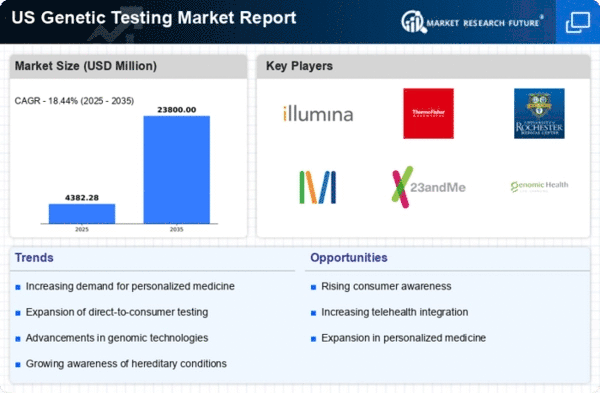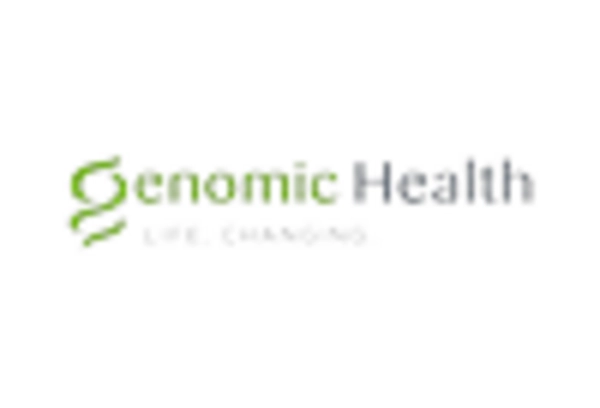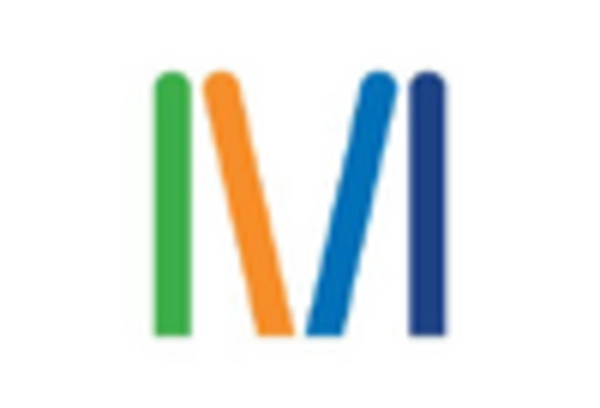Growing Awareness of Genetic Disorders
There is a growing awareness of genetic disorders among the general population, which is significantly impacting the genetic testing market. Educational initiatives and advocacy groups are playing a vital role in informing individuals about the importance of genetic testing for early detection and management of hereditary conditions. As more people recognize the potential benefits of genetic testing, the demand for these services is likely to increase. For instance, conditions such as cystic fibrosis and sickle cell anemia are being more frequently screened, leading to a projected growth rate of around 11% in the genetic testing market over the next five years. This heightened awareness is expected to drive market expansion as individuals seek proactive healthcare solutions.
Regulatory Support for Genetic Testing
Regulatory support is emerging as a significant driver for the genetic testing market. The US Food and Drug Administration (FDA) has been actively working to establish clear guidelines for genetic testing products, which is likely to enhance consumer confidence and encourage market growth. By providing a framework for the approval and oversight of genetic tests, regulatory bodies are helping to ensure the safety and efficacy of these products. This regulatory clarity is expected to facilitate innovation and investment in the genetic testing market, as companies can navigate the approval process more effectively. As a result, the market is poised for expansion, with a growing number of tests entering the marketplace.
Rising Demand for Personalized Medicine
The genetic testing market is experiencing a notable surge in demand for personalized medicine, which tailors medical treatment to individual characteristics. This trend is driven by an increasing awareness among patients and healthcare providers about the benefits of genetic insights in treatment decisions. According to recent data, the market for personalized medicine is projected to reach approximately $2 trillion by 2025, indicating a robust growth trajectory. As patients seek more effective and targeted therapies, Genetic testing plays a crucial role in identifying genetic predispositions and optimizing treatment plans. This shift towards personalized healthcare is likely to enhance patient outcomes and satisfaction, thereby propelling the growth of the genetic testing market.
Increased Investment in Genomic Research
Investment in genomic research is a key driver of growth in the genetic testing market. Government and private sector funding for research initiatives aimed at understanding genetic diseases and developing new testing methodologies is on the rise. In the US, the National Institutes of Health (NIH) has allocated substantial resources to genomics research, which is likely to foster innovation in genetic testing technologies. This influx of funding not only supports the development of new tests but also enhances the overall understanding of genetic conditions, thereby expanding the market. As research continues to advance, the genetic testing market is expected to benefit from new discoveries and improved testing capabilities.
Technological Advancements in Genetic Testing
Technological innovations are significantly transforming the genetic testing market, making tests more accessible, accurate, and affordable. Advances in next-generation sequencing (NGS) and bioinformatics have enabled the development of high-throughput testing methods, which can analyze vast amounts of genetic data rapidly. The cost of sequencing a human genome has decreased dramatically, from approximately $100 million in 2001 to around $1,000 today. This reduction in cost, coupled with improved accuracy, is likely to drive increased adoption of genetic testing services among healthcare providers and consumers alike. As technology continues to evolve, the genetic testing market is expected to expand, offering new opportunities for diagnostics and personalized treatment.
















